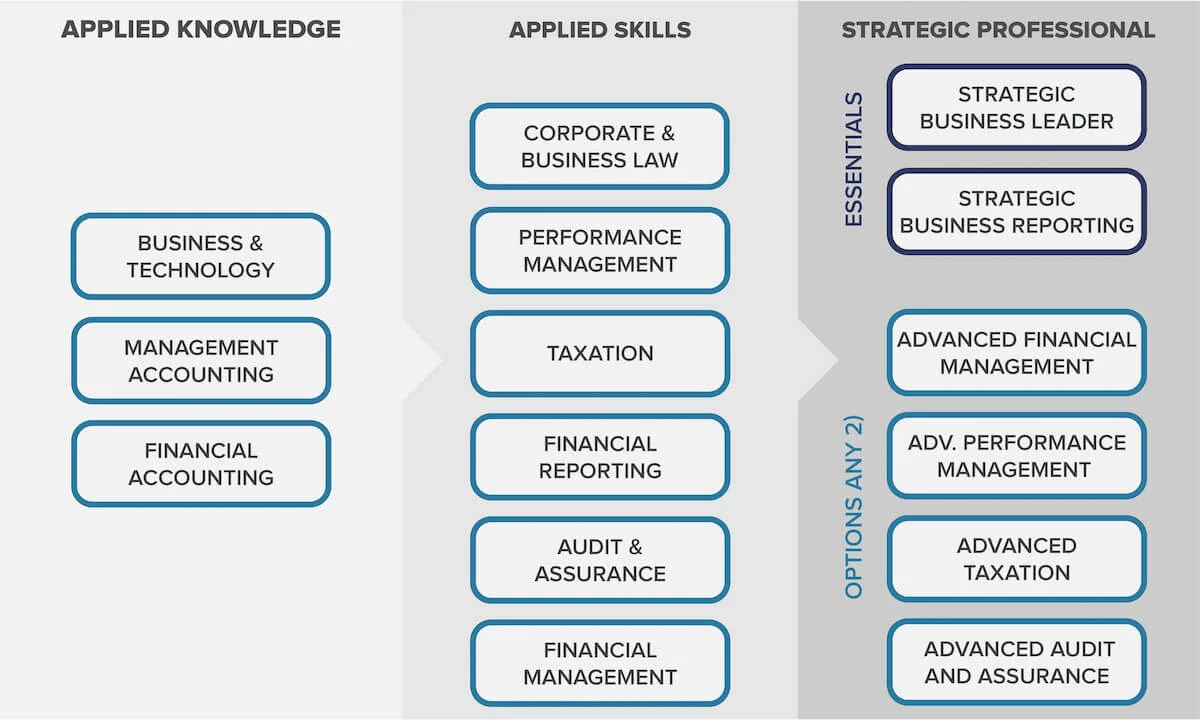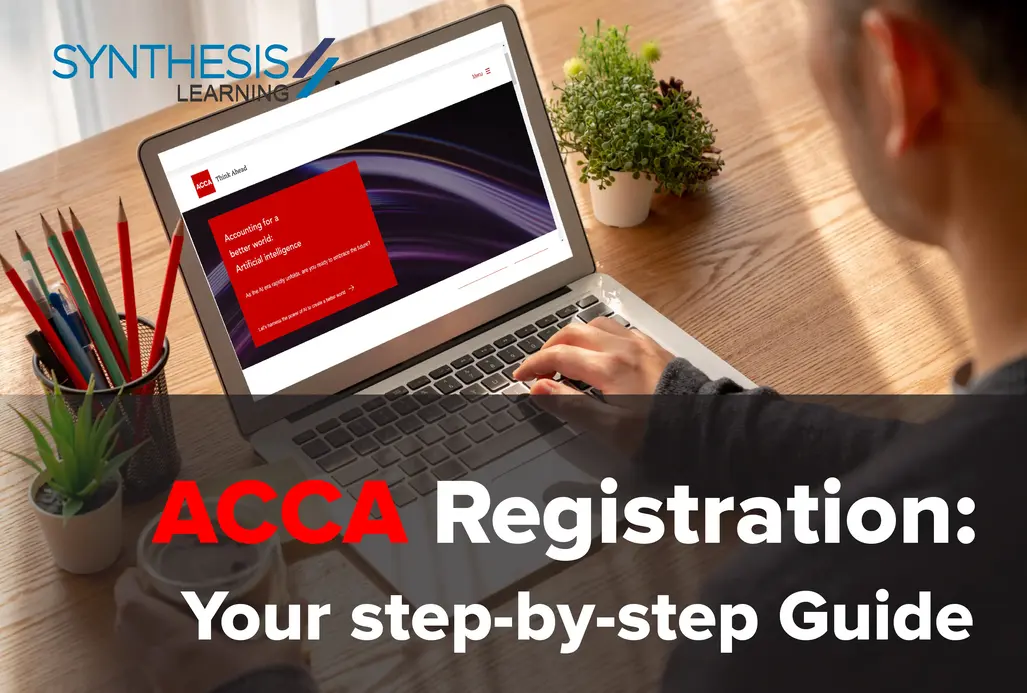The Basics
Since its inception in 1904, the Association of Chartered Certified Accountants (ACCA) has been a global leader in professional accounting. With 240,952 current members and 541,930 aspiring members worldwide, ACCA offers the prestigious Chartered Certified Accountant qualification. In today’s fiercely competitive business landscape, ACCA stands as a pivotal force in shaping successful careers.
To know the ACCA Qualification updates, check out the video below:
ACCA Syllabus
The ACCA journey is a three-stage ascent. Knowledge Level: Build your base with core accounting knowledge. Skills Level: Sharpen your skills, wielding finance like a pro. Professional Level: Conquer the peak, specializing and becoming a true strategic thinker. The ACCA syllabus – your map to the summit of accounting expertise. Climb smart, climb strong!
At the Skills Level of the ACCA qualification, you’ll embark on a journey builds upon the knowledge you gained in the previous. This stage is designed to help you understand the practical applications of finance, develop a strong financial acumen, and cultivate the necessary skills to excel as a business and finance professional globally across industries and sectors.
ACCA Syllabus for Skills Level:
The Skills Level consists of six examinations that delve deeper into specific areas of expertise. Let’s explore each module in detail:
1. Corporate and Business Law (LW)
Gain proficiency in comprehending general legal frameworks and specific business-related legal areas. Recognise the importance of seeking specialised legal advice as needed.
ACCA syllabus covered in Corporate and Business Law (LW) September 2023 to August 2024:
- Essential elements of legal systems
- International business transactions
- Transportation and payment of international business transactions
- The formation and constitution of business organisations
- Capital and the financing of companies
- Management, administration and the regulation of companies
- Insolvency law
- Corporate fraudulent and criminal behaviour
Law (LW) pass rates are 80% (Jun 2023).
Click here to download the syllabus and study guide for LW (September 2023 to August 2024.)
2. Performance Management (PM)
Master the application of management accounting techniques, seamlessly integrating quantitative and qualitative information for planning, decision-making, performance evaluation, and control.
ACCA syllabus covered in Performance Management(PM) September 2023 to August 2024:
- Management information systems and data analytics
- Specialist cost and management accounting techniques
- Decision-making techniques
- Budgeting and control
- Performance measurement and control
- Employability and technology skills
Performance Management (PM) pass rates are 40% (Sep 2023).
Click here to download the syllabus and study guide for PM (September 2023 to August 2024.)
3. Taxation (TX)
You’ll develop knowledge and skills relating to the tax system as applicable to individuals, single companies and groups.
ACCA syllabus covered in Taxation(Tax) September 2023 to August 2024:
- The UK tax system and its administration
- Income tax and NIC liabilities
- Chargeable gains for individuals
- Inheritance tax
- Corporation tax liabilities
- Value-added Tax (VAT)
- Employability and technology skills
Pass rates for Tax is 54% (Sep 2023).
Click here to download the syllabus and study guide for Tax(September 2023 to August 2024.)
4. Financial Reporting (FR)
Gain proficiency in comprehending accounting standards and theoretical frameworks. Learn how to effectively prepare financial statements for entities, including groups, and master the analysis and interpretation of these statements.
ACCA syllabus covered in Financial Reporting (FR) September 2023 to August 2024:
- The conceptual and regulatory framework for financial reporting
- Accounting for transactions in financial statements
- Analysing and interpreting the financial statements of single entities and groups
- Preparation of financial statements
- Employability and technology skills
Pass rates for Financial Reporting is 47% (Sep 2023).
Click here to download the syllabus and study guide for FR(September 2023 to August 2024.)
5. Audit and Assurance (AA)
You’ll develop knowledge and understanding of the assurance engagement process and its application in the context of the professional regulatory framework.
ACCA syllabus covered in Audit & Assurance (AA) September 2023 to August 2024:
- Audit framework and regulation
- Planning and risk assessment
- Internal control
- Audit evidence
- Review and reporting
- Employability and technology skills
Pass rates for Audit & Assurance are 42% (Sep 2023).
Click here to download the syllabus and study guide for AA(September 2023 to August 2024.)
6. Financial Management (FM)
You’ll develop the knowledge and skills expected of a finance manager with investment, financing and dividend policy decisions.
ACCA syllabus covered in Financial Management (FM) September 2023 to August 2024:
- Financial management function
- Financial management environment
- Working capital management
- Investment appraisal
- Business Finance
- Business valuations
- Risk management
- Employability and technology skills
Pass rates for Financial Management are 49% (Sep 2023).
Click here to download the syllabus and study guide for FM(September 2023 to August 2024.)
By successfully completing these examinations, you’ll acquire a comprehensive toolbox of financial skills and knowledge that will set you apart in today’s competitive business world. With expertise in finance, law, taxation, performance management, financial reporting, audit, and financial management, you’ll be able to navigate complex financial challenges and contribute to the success of any organization.
Please refer to our Skill level FAQs Blog if you have any questions.
*Here is a chart showing ACCA Syllabus
The Unique Approach of Synthesis Learning
Synthesis Learning pioneers innovation in education, implementing a precise 4-step process covering counseling, mentoring, coaching, and placements. This strategic approach guarantees ACCA students’ thorough comprehension and professional skill development.
Watch our toppers testimonial and know how Synthesis Learning can help you achieve your goal.
Please reach out to us at 9320007893/96. We will help you design a comprehensive ACCA journey.
Conclusion
The Applied Skills Level of the ACCA qualification is not just a destination; it’s the pinnacle you conquer after an exhilarating ascent. With a solid foundation of knowledge and the sharpened skills you acquire at this stage, you’ll be equipped to tackle any financial challenge that comes your way.
Consider this level as the stage where you transition from mastering theoretical concepts to navigating the ever-changing terrain of real-world finance. You’ll develop a strategic toolkit, honing your financial analysis, evaluation, and decision-making abilities. Regardless of your industry or sector, these skills will make you a sought-after finance professional capable of crunching numbers and translating them into actionable insights.
Remember, by embracing the ACCA syllabus and investing in your professional development, you’re empowering yourself to excel in the world of business and finance.






